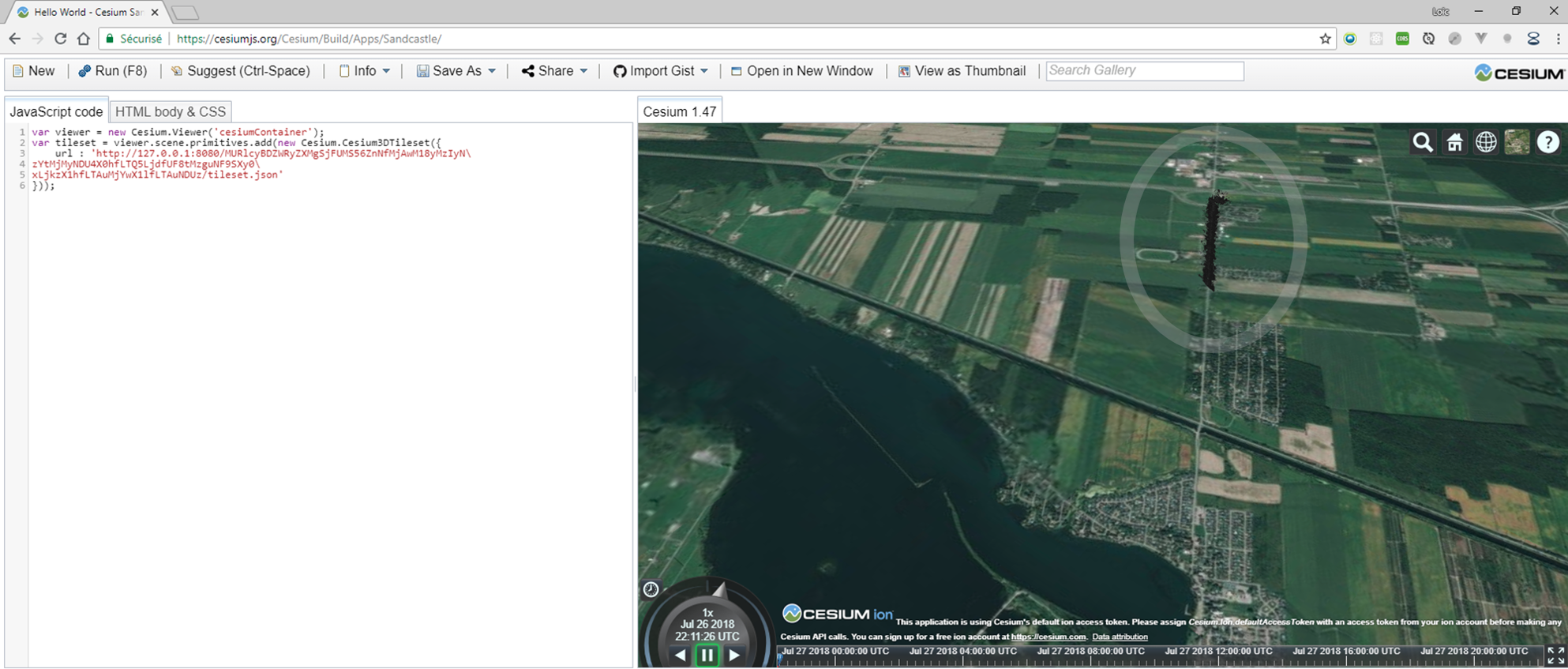Disclaimer:
This project is under active development and has been created to generate data as fast as possible at Jakarto (rush time). It doesn't cover either unit test, well-written documentation, or a sufficient level of abstraction to be used in different contexts. However, I will be more than happy to remove this disclaimer when improvements will be done. Feel free to open an issue to help the project.
Convert .las files to 3dtiles in batch using py3dtiles.
You can then easily visualize your supersized .las files on the Internet thanks to 3d viewers like Cesium or Itowns.
This project needs a docker image of py3dtiles. Please follow the instructions :
$ git clone https://github.com/Tofull/py3dtiles $ cd py3dtiles $ docker build -t py3dtiles .
Local installation (recommanded until the project support pypi integration)
$ git clone https://github.com/Tofull/py3dtiles_batcher $ cd py3dtiles_batcher $ pip install .
usage: py3dtiles_batcher [-h] [--dryrun] [--incremental] [--srs_in SRS_IN] [--srs_out SRS_OUT] [--cache_size CACHE_SIZE] [--docker_image DOCKER_IMAGE] [--verbose] [--norgb] output_folder [input_folder [input_folder ...]] Convert .las file to 3dtiles in batch. positional arguments: output_folder Directory to save tiles. input_folder Directory to watch. (default: .) optional arguments: -h, --help show this help message and exit --dryrun Active dryrun mode. No tile will be generated in this mode. (default: False) --incremental Active incremental mode. Skip tile if <output_folder>/<tile>/tileset.json exists. (default: False) --srs_in SRS_IN Srs in. (default: 2959) --srs_out SRS_OUT Srs out. (default: 4978) --cache_size CACHE_SIZE Cache size in MB. (default: 3135) --docker_image DOCKER_IMAGE py3dtiles docker image to use. (default: py3dtiles) --verbose, -v Verbosity (-v simple info, -vv more info, -vvv spawn info) (default: 0) --norgb Do not export rgb attributes (default: True) Working example (remove --dryrun when you want to generate tiles) : py3dtiles_batcher.exe "D:\data_py3dtiles\output" "D:\data_py3dtiles\raw" --dryrun -v
If you want to convert all .las from "D:data_py3dtilesraw" directory and save result into "D:data_py3dtilesoutput":
# On windows py3dtiles_batcher.exe -v "D:\data_py3dtiles\output" "D:\data_py3dtiles\raw"
You can select specific files or folder you want to convert:
# On windows py3dtiles_batcher.exe -v "D:\data_py3dtiles\output" "D:\data_py3dtiles\raw" "D:\folder1\file1.las" "D:\folder2"
- Remember to specify the srs_in option if its differs from EPSG:2959
- output path will be written in base64 encodage, to respect URL’s standard (which will be useful for 3d webviewer [Read What's next section]). Don't be surprised.
Visualize 3dtiles individually
Once yours .las files have been converted into 3dtiles, you can expose them individually over the Internet with any http server, like :
# using https://www.npmjs.com/package/http-server npm install http-server -g http-server D:\data_py3dtiles\output --cors -p 8080
Then, each tileset in subfolder is available over the Internet, and you can visualize it one by one using a 3d viewer, for example Cesium sandcastle :
Go to https://cesiumjs.org/Cesium/Build/Apps/Sandcastle/index.html
Insert the following code on Javascript Code section. Replace <base64_name> by the name of the directory of the tileset.json you want to visualize.
var viewer = new Cesium.Viewer('cesiumContainer'); var tileset = viewer.scene.primitives.add(new Cesium.Cesium3DTileset({ url : 'http://127.0.0.1:8080/<base64_name>/tileset.json' }));
Click Run (or F8) and enjoy.

Visualize merged 3dtiles
If you want to visualize all your 3dtiles at the same time, some steps are required to merge them into one big tileset.json. Hopefully, I created the merger tool. Please refer to it by clicking on the following link : https://github.com/Tofull/py3dtiles_merger
After some discussion with Oslandia' developers team, they have released a new version of py3dtiles with a "merge" command which is intended to do a better stuff than py3dtiles_merger. The previous command "py3dtiles" (renamed as "py3dtiles convert") - used to generate the individual 3dtiles - needed some changes (a well-done hierarchical 3d points structure from children, reconsidering a true computation of the geometricError attribute).
Contributions are welcome. Feel free to open an issue for a question, a remark, a typo, a bugfix or a wanted feature.
Copyright © 2018 Loïc Messal (@Tofull) and contributors
Distributed under the MIT Licence.